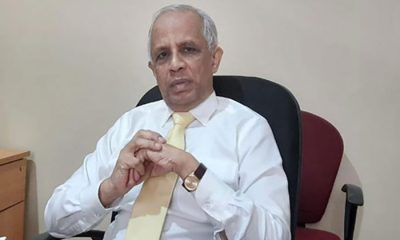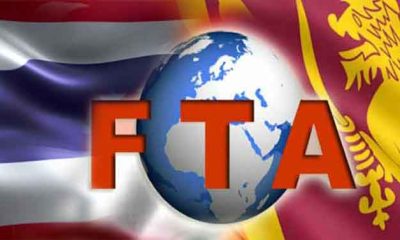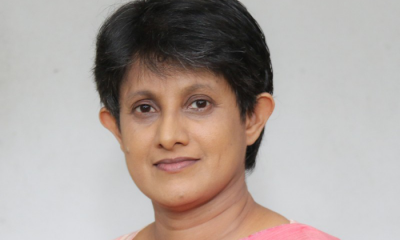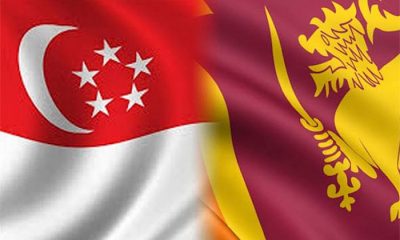News
FTA with Thailand: Need for SL to diversify trade portfolio stressed

By Rathindra Kuruwita
Over 50 percent of Sri Lankan exports to Thailand are gems, and Sri Lanka doesn’t face any trade barriers when exporting precious stones, Subhashini Abeysinghe, says Research Director at Verité Research.
Commenting on the recent free trade agreement between the two nations, she said in a recent television interview that Thailand imported around 300 billion U.S Dollars worth of goods each year, and Sri Lanka’s exports there amounted to about 100 million dollars.
“Thailand is one of the top sources for manufacturing and exporting jewellery. On the other hand, while Sri Lanka has a lot of gems, we are not a country that exports jewellery. We face no trade barrier in exporting gems to Thailand because they are an essential part of manufacturing jewellery,” she said.
Abeysinghe said the purpose of a free trade agreement (FTA) was to remove barriers to trade. She said that 30 percent of the types of goods Thailand already exports were not subjected to any tariffs.
“This means about 3,000 goods Thailand imports are already not taxed. These goods amount to 56 percent of total imports to Thailand. So, we already have duty-free access to over 150 billion dollars in the market, but we export miniscule amounts,” she said.
Abeysinghe said Sri Lanka had not been able to attract FDIs in manufacturing export-oriented products. Sri Lankan policymakers believed that the country would be able to attract such FDIs, if investors saw that Sri Lanka could export goods to many destinations without tariffs.
There was speculation that once the FTA with Thailand was signed, Sri Lanka would be able to attract Thai tourists, especially Buddhist tourists, she said, adding that Sri Lanka had the potential to develop Buddhist tourism.
“However, Thai tourists already have access to on-arrival visa facilities. Given that, I am not sure whether we can attract Thai tourists through an FTA. We can make things easier for tourists by changing the laws and regulations in the country. We don’t need an FTA for that,” she said.
Abeysinghe said Sri Lanka had an FTA with Singapore, a country that already had very low trade barriers. However, Thailand had trade barriers. For example, Sri Lankan garments face a 25 percent tariff when they enter the Thai market, she said.
She said in all trade agreements there was a “negative list,” a list of items that were not subjected to tariffs. Here, both Sri Lanka and Thailand have not relaxed duty on about 15 percent of imports.
“When we look at the FTA with Thailand, both sides have relaxed about 50 percent of the items that are traded. This is also divided into two categories, i.e., goods that are already not subjected to trade barriers and newly relaxed items. As we said earlier, already 30 percent of our exports are not subjected to barriers in Thailand. So, Thailand has only relaxed trade barriers on 20 percent of our exports. On the other hand, only 18 percent of Thai exports are bereft of trade barriers in Sri Lanka now. Here, we must contrast this agreement with the FTAs with India and Pakistan. We speak only about customs duties in the FTAs with India and Pakistan. However, with regard to FTAs with both Singapore and Thailand, we speak about all import duties,” Abysinghe said.
There is a 20 percent customs duty when one imports goods to Sri Lanka. Moreover, there is also a 10 percent Ports and Airports Levy (PAL) and sometimes a 40 percent cess. Thus, the total tax is about 70 percent, she said.
“So, we have agreed to remove all 70 percent, not only customs duties,” she said.
When one looked at the FTA with Thailand, one could say Sri Lanka can export 5,000 items without any barriers, Abeysinghe said, adding that people tended to confuse product coverage and trade coverage.
“There are a lot of items here, but Sri Lanka produced very little. When we look at our export profile, 100 goods account for 80 percent of our exports. We have to see how many of these 100 items have been allowed into Thailand. When we look at the FTA, Thais have lifted barriers only on about 25 percent of those goods,” she said.
Abeysinghe said Thailand produced a large array of goods, and about 49 percent of their trade was covered by the FTA. The problem here was that, compared to Thailand, Sri Lanka did not produce diverse products at a competitive rate, she said.
“This is our Achilles’ heel. I am not sure whether the signing of an FTA will be a solution for this,” he said.
Abeysinghe said Sri Lanka was still heavily dependent on Western markets for its exports and relied on a few items like garments, tea, coconut and rubber.
“The fact that we have not been able to shift to Asian markets and most of our major exports are agricultural goods is a problem. ASEAN countries, on the other hand, are linked to global supply chains. Unlike them, electronics, machinery and components make up less than five percent of our exports. Thais import a lot of such goods. But they hardly import any garments. There is a big mismatch here,” she said.
News
Israel resumes attacks as Iran vows to avenge supreme leader’s death
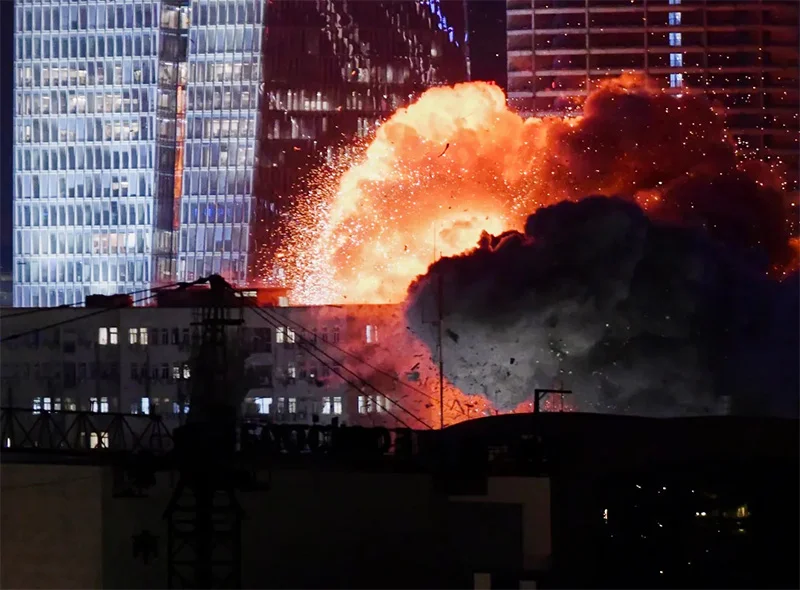
* Iran begins 40-day mourning after Khamenei killed in US-Israeli attack
* President Pezeshkian condemns killing as ‘a great crime’
Iran has begun 40 days of mourning after Supreme Leader Ayatollah Ali Khamenei was killed in ongoing attacks by the United States and Israel, according to Iranian state media.
Top security officials were also killed in Saturday’s strikes, along with Khamenei’s daughter, son-in-law and grandson. The killings mark one of the most significant blows to Iran’s leadership since the 1979 Islamic revolution Al Jazeera has reported.
Iranian President Masoud Pezeshkian condemned the killing as “a great crime”, according to a statement from his office. He also declared seven days of public holidays in addition to the 40-day mourning period.
Reporting from Tehran, Al Jazeera’s Tohid Asadi said people were pouring into the streets of the capital following the news of Khamenei’s killing.
“There will be expected ceremonies,” he said, noting they would likely take place amid continuing bombardment across the country.
Protests denouncing Khamenei’s killing were also reported elsewhere, including Shiraz, Yasuj and Lorestan.
“There will be expected ceremonies,” he said, noting they would likely take place amid continuing bombardment across the country.
Footage aired by Iranian state media showed supporters mourning at the shrine of Imam Reza in Mashhad, with several people seen crying and collapsing in grief, according to Al Jazeera.
The killing also led to protests in neighbouring Iraq, which declared three days of public mourning. In Baghdad, protesters confronted security forces in the heavily fortified Green Zone, which houses Iraqi government buildings and foreign embassies.
Videos verified by Al Jazeera showed demonstrators waving flags and shouting slogans, with witnesses saying some were attempting to mobilise towards the US Embassy. Footage also showed protesters blocking vehicles at a roundabout near one of the entrances to the area.
There was also a protest in the Pakistani city of Karachi, where footage, verified by Al Jazeera, showed people setting fire to and smashing the windows of the US consulate.
However, there have also been reports of celebrations in Iran, with the Reuters news agency quoting witnesses as saying some people had taken to the streets in Tehran, the nearby city of Karaj and the central city of Isfahan.
Meanwhile, the official IRNA news agency reported that a three-person council, consisting of the country’s president, the chief of the judiciary, and one of the jurists of the Guardian Council, will temporarily assume all leadership duties in the country. The body will temporarily oversee the country until a new supreme leader is elected.
Ali Larijani, the head of Iran’s Supreme National Security Council, accused the US and Israel of trying to plunder Iran, in an interview aired on state TV.
He also called on Iranians to unite. “Groups seeking to divide Iran should know that we will not tolerate it,” he added.
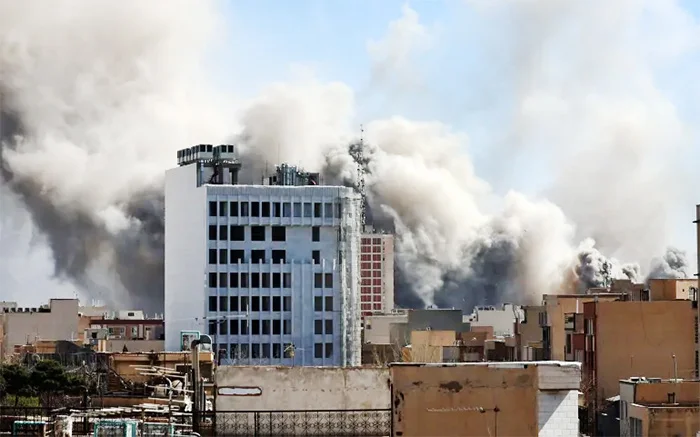
Smoke rises over central Tehran following ongoing U.S.–Israeli strikes on Iran yesterday.[EPA]
Khamenei assumed leadership of Iran in 1989 following the death of Ayatollah Ruhollah Khomeini, who had led the Islamic revolution a decade earlier.
While Khomeini was regarded as the ideological force behind the revolution that ended the Pahlavi monarchy, Khamenei went on to shape Iran’s military and paramilitary apparatus, strengthening both its domestic control and its regional influence.
Meanwhile, the Islamic Revolutionary Guard Corps (IRGC) pledged revenge and said it had launched strikes on 27 bases hosting US troops in the region, as well as Israeli military facilities in Tel Aviv.
Explosions have continued to be reported in Qatar and the United Arab Emirates, while security alerts are in place in several countries across the region.
US President Donald Trump, in a social media post on Sunday, warned Iran that it would be hit “with a force that has ?never been seen before” if it retaliated.
Iran’s retaliatory attacks since Saturday have targeted Israel and US assets across multiple Middle East countries, including Qatar, the UAE, Kuwait, Bahrain, Jordan, Saudi Arabia and Iraq.
Harlan Ullman, chairman of the strategic advisory firm Killowen Group and an adviser to the Atlantic Council in Washington, DC, said the US may have made a “big mistake” by killing Khamenei.
“Decapitation only works when you get all the leaders, and I don’t think that we got all the leaders,” Ullman said, adding that the US should not expect Iran’s leadership to enter negotiations in the immediate aftermath.
Iranian state media reported on Saturday at least 201 people have been killed in the joint US-Israeli attacks across 24 provinces, citing the Red Crescent. In southern Iran, at least 148 people were killed and 95 wounded in a strike on an elementary girls’ school in Minab on Saturday, with the toll continuing to rise, according to state media.
News
CPC has enough fuel stocks
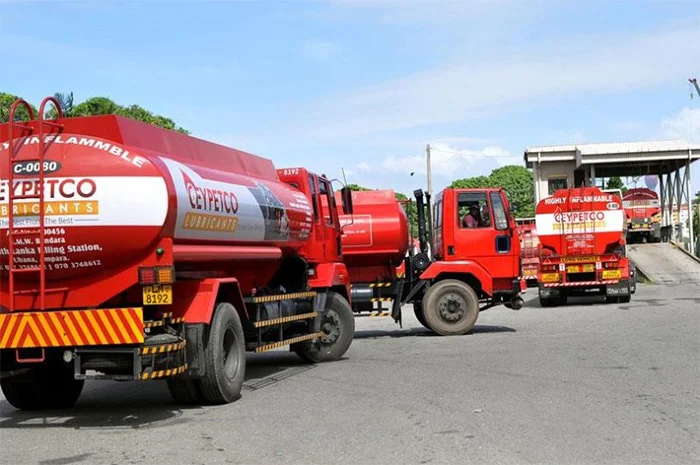
There would be no delay in fuel shipments scheduled for April and May, the Ceylon Petroleum Corporation (CPC) assured yesterday.
Addressing a media briefing in Colombo, CPC Chairman D.J. Rajakaruna said Sri Lanka’s fuel supplies did not originate from the present conflict zone in West Asia and, therefore, supplies to the Corporation would not be disrupted.
He noted that the relevant consignments were due to arrive from India and Singapore as planned.
“We are making this statement responsibly. There is no need for the public to queue up for fuel. Distribution was not originally scheduled for Sunday (01), but due to increased demand, we have deployed all distribution staff to continue fuel issuance. Although Monday (02) is a Poya Day, fuel supplies will continue without interruption,” he said.
The Chairman added that all filling stations had been instructed not to dispense fuel into cans or barrels, warning that legal action would be taken against those attempting to purchase fuel in bulk containers for resale.
News
Lanka, Pakistan strengthen ties at 13th JEC

The 13th Session of the Sri Lanka–Pakistan Joint Economic Commission (JEC) was successfully held recently in Colombo, reinforcing the strong and longstanding economic and diplomatic ties between the two countries.
The Sri Lankan delegation was led by Wasantha Samarasinghe, Minister of Trade, Commerce, Food Security and Cooperative Development, while the Pakistani delegation was headed by Haroon Akhtar Khan, Special Assistant to the Prime Minister of Pakistan for Industries and Production. The session concluded with the signing of the Agreed Minutes by both Co-Chairs, formalising cooperation across multiple sectors.
The Pakistan High Commission in Colombo said that in the IT and digital economy, both sides agreed in principle to establish a Joint Working Group on IT and telecommunications, promote collaboration in emerging technologies, and support each other in international digital forums.
Industrial cooperation was a key focus, with discussions on expanding trade in chemicals, polymers, engineering goods, glassware, surgical instruments, and pharmaceuticals. Sri Lanka invited Pakistani pharmaceutical companies to explore investment opportunities in designated pharmaceutical zones. Both countries also agreed to strengthen collaboration in Export Processing Zones and enhance support for small and medium enterprises through their respective development agencies.
Significant progress was made in agriculture and livestock, including cooperation on meat exports, livestock farming, seed certification, sanitary and phytosanitary harmonisation, pest risk analysis, and capacity building. Procedures for the export of Sri Lankan pineapples and avocados to Pakistan were advanced. Both sides explored electronic phytosanitary certification (ePhyto), blockchain-based seed traceability systems, and increased trade in agro-commodities such as rice, sesame, and onions.
In education, the JEC emphasised academic and research cooperation, faculty and student exchanges, accreditation and quality assurance, and promoting Pakistan as a higher education destination for Sri Lankan students. A Joint Working Group on Education and Science was proposed, alongside renewal of several institutional Memoranda of Understanding.
Cooperation in science, technology, and innovation will continue under existing bilateral frameworks, with plans for joint research in advanced materials, biotechnology, climate change mitigation, and emerging technologies. Collaborative research projects, student exchanges, and co-authored publications were highlighted as key initiatives.
Health sector collaboration will focus on joint research, academic exchanges, regulatory cooperation on therapeutic goods, capacity building, fast-track registration of essential medicines, public-private partnerships, epidemiological surveillance, and coordinated responses to disease outbreaks.
Maritime cooperation was also discussed, with Pakistan offering technical expertise, training, and industrial collaboration through its shipbuilding institutions. Both sides explored enhanced maritime connectivity, including transshipment, port cooperation at Karachi and Gwadar, direct shipping routes, logistics integration, and maritime training programs.
Commerce secretary-level talks reviewed the progress of the Pakistan–Sri Lanka Free Trade Agreement (PSFTA), assessing current implementation and identifying measures to further enhance bilateral trade and economic cooperation.
On the sidelines, Special Assistant Haroon Akhtar Khan held discussions with Sri Lankan Cabinet members on collaboration in industry, labor and foreign employment, and health sectors.
Both delegations expressed satisfaction with the outcomes of the 13th JEC and reaffirmed their commitment to regular engagement and effective implementation of agreed initiatives. It was mutually agreed that the 14th session will be held in Islamabad, with dates to be confirmed through diplomatic channels.
-
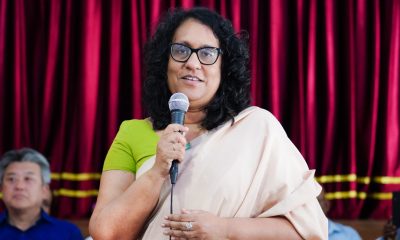
 News7 days ago
News7 days agoPrime Minister Attends the 40th Anniversary of the Sri Lanka Nippon Educational and Cultural Centre
-

 Opinion3 days ago
Opinion3 days agoJamming and re-setting the world: What is the role of Donald Trump?
-
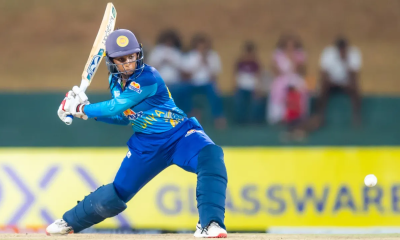
 Sports7 days ago
Sports7 days agoDottin out obstructing the field as Sri Lanka clinch series
-

 Features3 days ago
Features3 days agoAn innocent bystander or a passive onlooker?
-

 Features5 days ago
Features5 days agoBuilding on Sand: The Indian market trap
-

 Opinion5 days ago
Opinion5 days agoFuture must be won
-

 Features4 days ago
Features4 days agoRatmalana Airport: The Truth, The Whole Truth, And Nothing But The Truth
-

 Business5 days ago
Business5 days agoDialog partners with Xiaomi to introduce Redmi Note 15 5G Series in Sri Lanka


